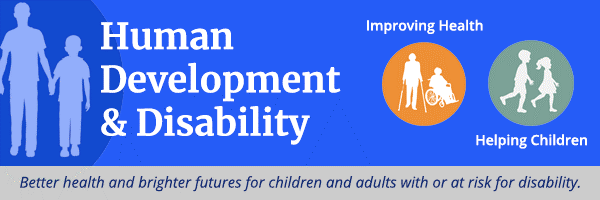DHDD Newsletter – June 2020

A Note from the DHDD Director:
Dear colleagues –
I am back to DHDD from my deployment to the COVID-19 response. It was a busy and fulfilling several months. I enjoyed the opportunity to contribute to the response, in particular helping to ensure that people with disabilities are included in COVID-19 prevention and mitigation efforts. It’s good to be back now in DHDD this month reintegrating into all the great work underway at DHDD. I look forward to connecting with you and hearing about your work. Thank you for your continued support. I appreciate all that you do.
Take care and stay well,
Georgina Peacock
Director, Division of Human Development and Disability
In the Spotlight
New Project Addresses the Needs of People with Disability in COVID-19

CDC has funded the Association of State and Territorial Health Officials (ASTHO), the National Association of County and City Health Officials (NACCHO) and the Association of University Centers on Disabilities (AUCD) through a project titled, Addressing Needs of People with Disability in COVID-19 Preparedness, Planning, Mitigation, and Recovery Efforts in the United States.
The purpose of this project is to ensure that the needs of people with disabilities are addressed in COVID-19 planning, mitigation, and recovery efforts through
- Inclusion of people with disabilities in state, territorial, and city/county health departments’ local preparedness and response efforts;
- Improved understanding of the unique health care service needs of people with disabilities before, during, and after a pandemic; and
- Partner engagement to share and disseminate emergency preparedness and response resources related to COVID-19 and related events for people with disabilities.
Tourette Syndrome Awareness Month

DHDD’s Child Development Studies team released a new feature for Tourette Syndrome Awareness Month, Tourette Syndrome: Behavioral Treatment for Tics That Works.
The feature highlights what CDC is doing to raise awareness and increase access to effective behavioral treatment for Tourette syndrome.
New Resources
A Video for Adults with I/DD and Type 2 Diabetes

South Carolina recently launched a new diabetes educational video – with input from ten Disability and Health Program funded states – to educate adults with intellectual and developmental disabilites (I/DD) who have type 2 diabetes about the importance of taking charge of their health. DHDD’s Disability and Health Promotion Branch (DHPB), funds the South Carolina Disability and Health Program through the cooperative agreement titled, Improving the Health of People with Mobility Limitations and Intellectual Disabilities through State-based Public Health Programs.
New SEED Resource

DHDD’s Study to Explore Early Development (SEED), the largest study in the United States to help identify factors that may put children at risk for autism spectrum disorder (ASD) and other developmental disabilities, recently released its Summer 2020 Newsletter with study updates and resources for families and professionals.
Read the newsletter.
Tune in to the Next Act Early Network Webinar “Marking a Milestone for CDC’s Milestone Tracker App” on July 22 from 3-4pm EDT
During this webinar, DHDD’s “Learn the Signs. Act Early.” (LTSAE) program will provide an in-depth update on the current status of its unique developmental monitoring tool, CDC’s Milestone Tracker app. Presenters will share background information on the app, highlight app metrics to date, and provide recommendations on ways to integrate the app into systems and programs that serve young children. The program developed the Milestone Tracker app to help parents and providers practice developmental monitoring. Tune in to learn more about the impact of CDC’s Milestone Tracker app to date, and how your program can take part!
Publications
A Framework for Coordination Between Obstetric and Pediatric Providers in Public Health Emergencies

Health threats during pregnancy present unique coordination and communication challenges for obstetric and pediatric providers that can affect critical care and follow-up for both the mother and infant, particularly during a public health emergency.
In the recent publication, A framework for coordination between obstetric and pediatric providers in public health emergencies: Lessons learned from the Zika outbreak in the Americas, 2015-2017, CDC and partners present a novel Children’s Interdisciplinary Care Coordination (ChICC) Framework to address the care coordination needs of pregnant women and their infants with possible exposure to emerging infectious and noninfectious health threats.
Etiology of Prelingual Hearing Loss

Researchers from CDC’s NCBDDD and the National Center for Immunization and Respiratory Diseases (NCIRD) published a new article in the Otolaryngology–Head and Neck Surgery Journal, Etiology of Prelingual Hearing Loss in the Universal Newborn Hearing Screening Era: A Scoping Review.
According to this article, which included findings from 20 studies that met the inclusion criteria, among 1787 children who were identified as deaf or hard of hearing before 2 years of age and received testing to determine the cause of hearing loss, 933 (52.2%) were tested for genetic mutations and 1021 (57.1%) for congenital CMV infection. The proportion of congenital hearing loss cases attributable to genetic etiology ranged between 7.7% and 83.3% and to congenital CMV infection between 0.0% and 32.0%.
The proportion of congenital hearing loss cases attributable to genetic etiologies and congenital CMV infection appears to vary widely.
Read the article
Indicators of Social Competence and Social Participation Among US Children with Tourette Syndrome

In this study published in Journal of Child Neurology, authors from DHDD’s Child Development Studies team, found that children with Tourette syndrome are more likely to struggle with social competence than children without Tourette syndrome, particularly when they have moderate to severe Tourette syndrome and when they are diagnosed with other mental, emotional, or behavioral disorders.
Read the full scientific article.
DHDD’S mission is to lead inclusive programs to optimize the health and development of children and adults with, or at risk for, disabilities.
